Intel Core i7 4960X (Ivy Bridge E) Review
by Anand Lal Shimpi on September 3, 2013 4:10 AM EST- Posted in
- CPUs
- Intel
- Ivy Bridge
- Ivy Bridge-E
Video Transcoding
With our lightly threaded tests behind us, it's time to move to more CPU intensive pastures.
We migrated to the latest verison of the x264 HD benchmark which features a much newer version of x264 and a much heavier workload. The focus here is on quality rather than speed, thus the benchmark uses a 2-pass encode and reports the average frame rate in each pass.
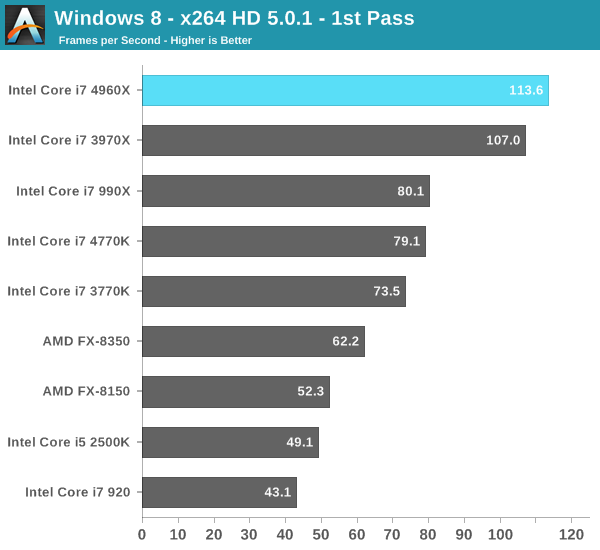
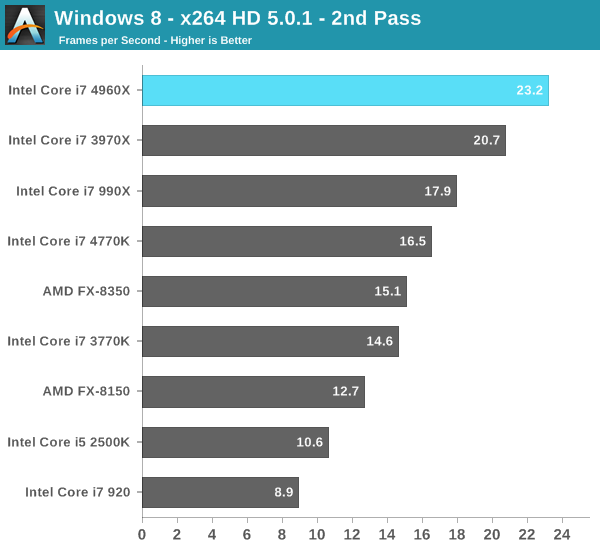
Here we see all of the 6-core parts rise to the top, including Intel's old Gulftown based Core i7-990X. Despite being a few years old at this point, the 990X's 6-core design and relatively high clock speed gives it better performance here than the quad-core Haswell 4770K.
The 4960X manages to be around 30% faster than the old 990X, and is 40% faster than the 4770K. For heavily threaded applications, there's simply no replacement for more cores.
Just like I did earlier, I dusted off one of our really old x264 tests so we'd have comparison data to even older CPUs including the Pentium 4 and Penryn based Extreme Edition parts:
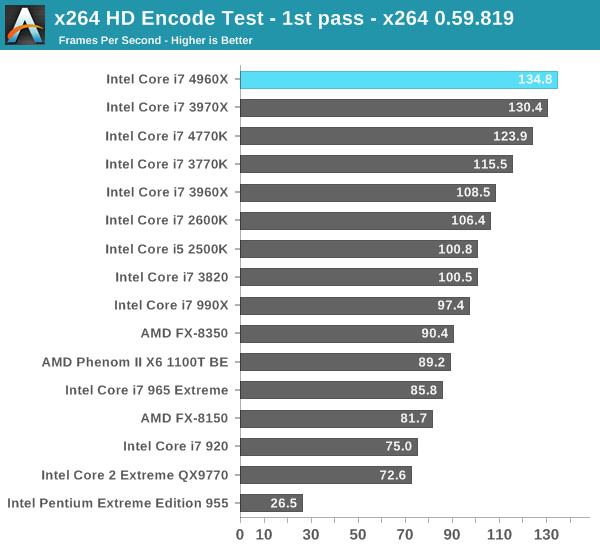
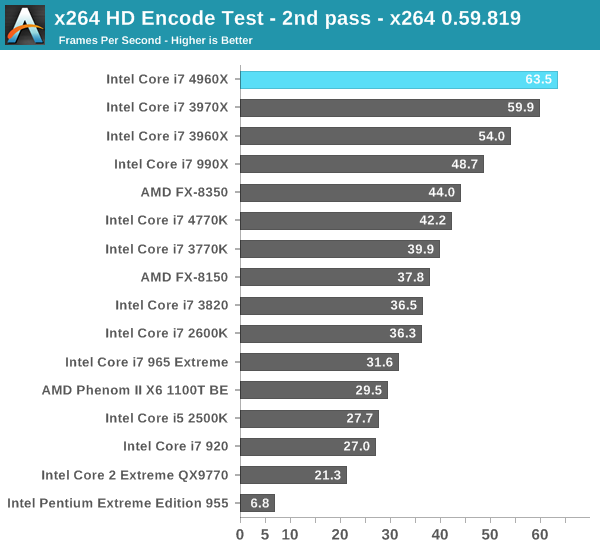
The 4960X manages to deliver nearly 3x the performance of Intel's flagship from 6 years ago. The Pentium EE 955 comparison is even more insane. IVB-E is basically an order of magnitude faster than the last high-end Pentium 4s to come out of Intel back in 2005.
3D Rendering
Our new POV-Ray benchmark uses the latest beta binary (3.7RC6) and runs through both single and multithreaded versions of the popular raytracing benchmark.
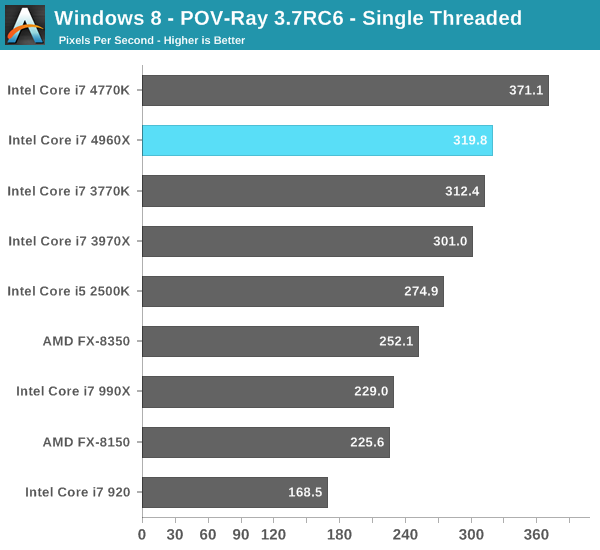
Isolating a single core shows us exactly what we're missing by having Ivy Bridge at the heart of the 4960X instead of Haswell. Here the 4770K manages a 16% performance advantage over the 4960X, which costs 3x as much and draws substantially more power. Looking at AMD's FX-8350 however it's clear why Intel can get away with launching a high-end 6-core chip without its latest cores. Piledriver's single threaded performance falls somewhere between Nehalem and Sandy Bridge, giving Intel room to launch another Ivy Bridge based high-end SKU in 2013 and get away with it.
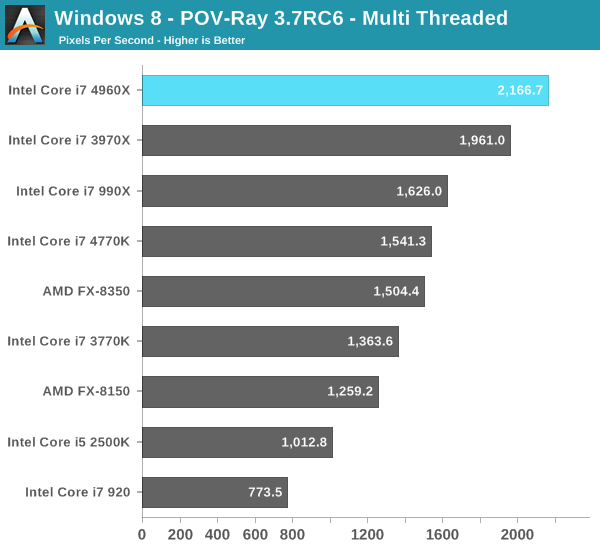
The multithreaded performance story is very different. Here even the Gulftown based 990X is faster than Haswell thanks to its six cores. The 4960X is 40% faster than the Haswell based 4770K. Even AMD's FX-8350 does really well here, basically equalling Haswell's performance.
Created by the Cinema 4D folks we have Cinebench, a popular 3D rendering benchmark that gives us both single and multi-threaded 3D rendering results.
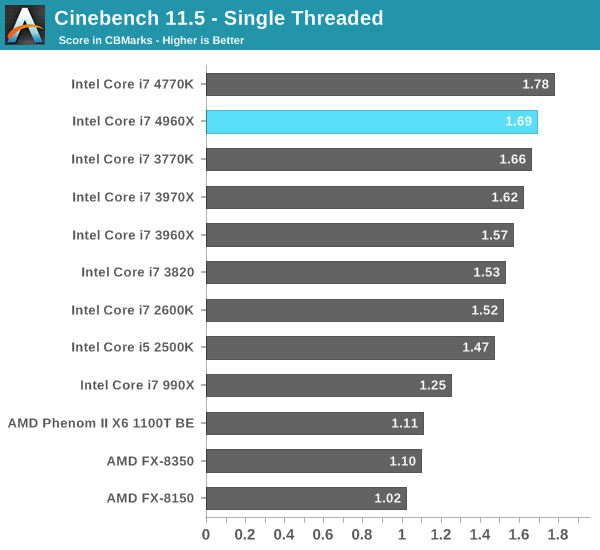
In Cinebench, the single threaded Haswell/IVB-E gap narrows to 5%.
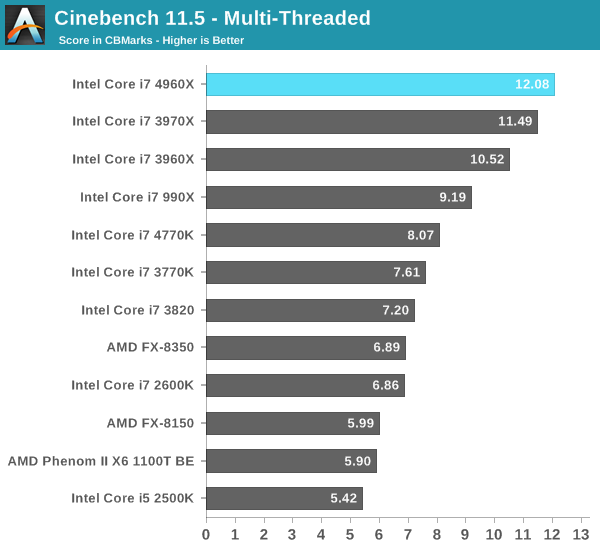
Multithreaded performance continues to be just stellar. Here the 4960X is just under 50% faster than the 4770K. Note the relatively small gap between the 4960X and the SNB-E based 3970X however - the performance gain is only 5%. The bulk of Ivy Bridge's advancements were in GPU performance (not applicable to IVB-E) and power consumption (which we'll get to shortly).
Our final two Cinebench tests use the R10 benchmark to enable a comparison to more/older data points:
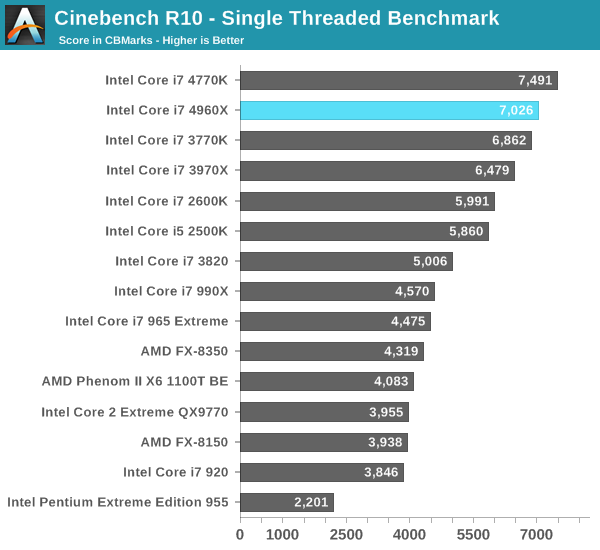
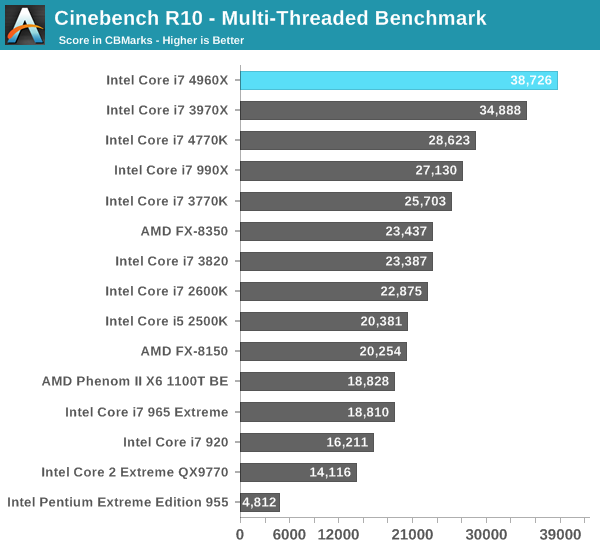










120 Comments
View All Comments
wsaenotsock - Tuesday, September 3, 2013 - link
How does Intel's closed-loop cooling package compare to say, Corsair's or other similar products?chizow - Tuesday, September 3, 2013 - link
Probably within 1-2C of similar "extra wide" 120x37mm closed-loop coolers. Looks like Intel's solution is made by Asetek going by it's block and mounting design, so I'd compare it against the Antec 920 for starters.Samus - Tuesday, September 3, 2013 - link
Still running i7-950 system (was an i7-920 back in 2008) and all I've upgraded since building it is a small bump in CPU speed, added water cooling, and installed two GTX660's in place of two GTX460's installed in 2010, which replaced the Radeon 4870x2 from the original 2008 assembly date. I've also replaced the original 500GB Seagate Boot Drive from 2008 with an Intel 160GB X25-M in 2010. Still use the same SSD to this day.Same motherboard, same 6x2GB G.skill DDR3-1600 modules (that cost $600 back in 2008) and same PC Power & Cooling 750-QUAD.
I've added a USB 3.0 PCIe controller as well.
Overall, this is the longest (5 years) I've ever owned a system that retained the same motherboard. The irony is Intel discontinued Socket 1366 so fast it wasn't even funny. It was actively supported less than 2 years, and only 2 generations of chips (using the same architecture and process) were made within a year of each other, essentially giving this socket a 15-month lifetime.
But 5 years later, a system built on this socket is still faster than 90% of the production systems today.
Assimilator87 - Tuesday, September 3, 2013 - link
Yeah, for 1366 owners, there's absolutely no reason to upgrade, especially with overclocking. At least you got one generation of upgrades, unlike 1156 owners who got completely screwed.P.S. The second gen upgrade on 1366 (Westmere) was a new architecture and process. They shrunk down from 45nm to 32nm and added AES instructions.
Inso-ThinkTank - Sunday, January 19, 2014 - link
I'm a current 1156 socket owner running I7 875K @ 4.2. My rig is still running strong, but I'm ready for an upgrade. Just purchase a 4960x with 16 gig of Corsair Dominator Platinum at 2400 and the Asus Black Edition mobo. Hope the spending is worth it.evilspoons - Tuesday, September 3, 2013 - link
What does this have to do with chizow's comment about the closed-loop cooler??JPForums - Thursday, September 5, 2013 - link
Absolutely nothing. I'm guessing it was just an easy way to get posted near the top.
If I recall correctly, the 920 is 49mm thick. Also, I've found that fan selection can make more than a little difference. I would not expect the Intel cooler to match Antec's 920, given their history of racing to the bottom with cooler components. That said, it should beat the 620 and similar 120x120x25mm closed loop systems (assuming they didn't screw up the fan selection in epic manner).
foursixty - Saturday, April 5, 2014 - link
I run a i7950 at 4.07 ghz with a overclocking thermaltake cooler, 3x 580's and 12 gb ddr, am now upgrading to the i74960x, thermaltake water 3.0 and 2 x asus gtx 780ti sli, 32 gb ddr3. the old rig is still going strong and will use it for a simulator pc as i have a g27 sitting doing nothing. Great machine and has served me well!~foursixty - Saturday, April 5, 2014 - link
just might add for the asus sabertooth x79, i74960x, 32gb 2400 ddr3, and 2 asus gtx 780ti oc cards is a $4000 upgrade, been doing a lot of overtime so i thought i would update while i got the extra cashjust4U - Friday, September 6, 2013 - link
Corsairs closed loop and Intel's appear to be built by the same company.. Some of Corsair's earlier attempts were noisy whereas you didn't really have that problem with Intel's. Overall I think it's a pretty solid contender with very few faults. There is better on the market obviously... but it's decent for it's price.